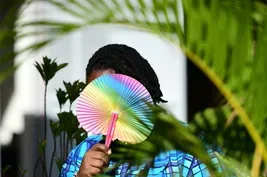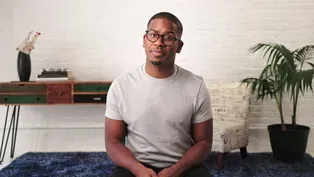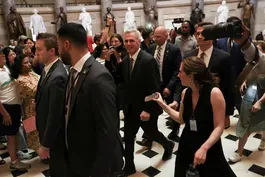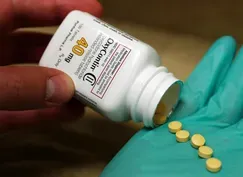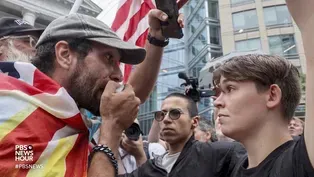
The hidden toll of police violence on some AAPI communities
Clip: 5/31/2023 | 9m 17sVideo has Closed Captions
The hidden toll of fatal police violence on some AAPI communities
The national attention on acts of police brutality often overlooks one group of victims, Asian Americans and Pacific Islanders. That's because data show that, as a whole, they experience low rates of fatal police violence. But new research shows the risks they face are much higher. Ali Rogin reports from Antioch, California, for our series, Race Matters. A warning: some images may be disturbing.
Problems with Closed Captions? Closed Captioning Feedback
Problems with Closed Captions? Closed Captioning Feedback
Major corporate funding for the PBS News Hour is provided by BDO, BNSF, Consumer Cellular, American Cruise Lines, and Raymond James. Funding for the PBS NewsHour Weekend is provided by...

The hidden toll of police violence on some AAPI communities
Clip: 5/31/2023 | 9m 17sVideo has Closed Captions
The national attention on acts of police brutality often overlooks one group of victims, Asian Americans and Pacific Islanders. That's because data show that, as a whole, they experience low rates of fatal police violence. But new research shows the risks they face are much higher. Ali Rogin reports from Antioch, California, for our series, Race Matters. A warning: some images may be disturbing.
Problems with Closed Captions? Closed Captioning Feedback
How to Watch PBS News Hour
PBS News Hour is available to stream on pbs.org and the free PBS App, available on iPhone, Apple TV, Android TV, Android smartphones, Amazon Fire TV, Amazon Fire Tablet, Roku, Samsung Smart TV, and Vizio.
Providing Support for PBS.org
Learn Moreabout PBS online sponsorshipGEOFF BENNETT: The national focus on acts of police brutality often overlooks victims who are Asian American and Pacific Islander.
That's because data show that, as a whole, they experience low rates of fatal police violence, but new research shows the risks some in that community face are much higher.
Ali Rogin starts this report in Antioch, California.
It's part of our Race Matters series.
And a warning: Some images may be disturbing.
CASSANDRA QUINTO-COLLINS, Mother of Angelo: This is Angelo's room.
This is his altar.
ALI ROGIN: Cassandra Quinto-Collins visits her late son Angelo's bedroom often to help keep his memory alive.
CASSANDRA QUINTO-COLLINS: I turn the light on every night.
I say good morning to him every morning.
I don't know.
I'm just very sentimental.
ALI ROGIN: Of course.
CASSANDRA QUINTO-COLLINS: It's like I still feel like this is -- he's here.
ALI ROGIN: Angelo's younger sister, Bella, remembers him by watching old videos.
BELLA COLLINS, Sister of Angelo: He always wanted to entertain my friends and I.
You know, he would just do cartwheels outside the house with us.
ALI ROGIN: Happy memories growing up in the Philippines and the U.S., but his family says the Navy veteran's 30 years were also shaped by mental health issues.
BELLA COLLINS: He would have these infrequent episodes of fear and paranoia.
During those episodes, he wanted us to be together to make sure that nothing happened to us.
ALI ROGIN: One evening in December 2020, Angelo became paranoid and tried to restrain his mother and sister, something they say he'd never done before.
BELLA COLLINS: I really felt desperate for somebody to come and help de-escalate and just calm him down, because all of us were just really, really anxious.
ALI ROGIN: So, Bella called 911.
CASSANDRA QUINTO-COLLINS: This is where it happened.
He was laying here.
ALI ROGIN: Police handcuffed Angelo in Cassandra's bedroom.
Then, she says, they turned him on his stomach and knelt on him.
Within minutes, he was unresponsive.
She filmed her son being carried out to paramedics.
CASSANDRA QUINTO-COLLINS: That's when I panicked.
That's when I started asking, what's happening?
What's going on?
Does he have a pulse?
But nobody was answering me.
ALI ROGIN: He never regained consciousness and died three days later.
Angelo Quinto is part of a largely overlooked group of victims of fatal police encounters in this country, Asian Americans and Pacific Islanders, or AAPIs.
GABRIEL SCHWARTZ, Unfortunately of California, San Francisco: It's a hugely diverse community with dozens and dozens of countries of origin, really different histories of colonization and immigration.
And all of those things shape their exposure to the police and their interactions with police.
ALI ROGIN: Gabriel Schwartz is an epidemiologist who studies public health and policing at the University of California, San Francisco.
America's more than 25 million Asian Americans and Pacific Islanders have roots in more than 30 countries and, as a whole, they experience the lowest rates of fatal police violence out of any racial group in the U.S.
But Schwartz says that hides a disturbing reality.
GABRIEL SCHWARTZ: At sort of the regional level, Pacific Islanders are experiencing levels of police violence that are lethal, on par with Native Americans, on par with Black Americans.
And the lower Southeast Asian Americans whose countries of origin were affected by the U.S. war in Southeast Asia.
Vietnamese, Cambodian, Lao, Hmong people, are all experiencing much higher levels than sort of other Southeast Asians even or East or South Asians.
ALI ROGIN: Americans from Southeast Asia, like the Quinto family, and Pacific Islanders make up less than 40 percent of AAPIs in the U.S. Schwartz says their outsized risks are hidden when combined with other Asian Americans.
He believes the unique histories of both small communities may play a role in the higher rates of fatal police violence they experience.
VINNY ENG, Son of Cambodian Refugees: When my parents and my sisters boarded that plane to come to the United States in 1979, it was the first time they had ever taken a flight.
ALI ROGIN: Vinny Eng's family moved to Los Angeles after surviving three years in a labor camp run by Cambodia's brutal Khmer Rouge regime.
The Engs were part of the biggest resettlement of refugees in U.S. history.
Starting in 1975, more than one million people fleeing U.S.-involved conflicts in Southeast Asia moved to America.
VINNY ENG: For the 30 years following their arrival to Los Angeles, they were learning something new every day.
ALI ROGIN: There was no long-term or support for this wave of Southeast Asian refugees when they arrived in the U.S., and many struggled to get out of poverty.
Researcher Gabriel Schwartz says that legacy may increase the likelihood of potentially fatal police interactions.
GABRIEL SCHWARTZ: Because that then makes communities have higher rates of poverty, higher rates of discrimination in education, in the work force, people are poorer.
People are living in neighborhoods that are more overpoliced, and that puts them in the path of the criminal legal system.
ALI ROGIN: Schwartz says that America's Pacific Islander communities also face those acute outcomes in part because of their history.
GABRIEL SCHWARTZ: Many Pacific Islanders are here because of U.S. colonization that has made the economies of the Pacific islands much more reliant on the United States, have fewer opportunities than they otherwise might have.
ALI ROGIN: Gaynor Siataga is a Samoan-Latina community advocate in San Francisco.
GAYNOR SIATAGA, Director, Pacific Islander Resource Hut: So Pacific Islanders here in the city have the highest disparities in everything.
ALI ROGIN: She says police killings were a fact of life growing up.
GAYNOR SIATAGA: I have seen it firsthand.
I had four folks that are very close to me, family, all shot and killed by police.
ALI ROGIN: Several of her family members were incarcerated, and she joined a gang when she was 11 after being sexually assaulted.
GAYNOR SIATAGA: It was just it was a group of folks that were way older to me that I finally was able to share this secret with.
Like, as a kid, you don't know what's wrong or right.
ALI ROGIN: Gang life led to repeated violence, she says GAYNOR SIATAGA: The first time I was shot was 13.
ALI ROGIN: And run-ins with law enforcement.
GAYNOR SIATAGA: They even had my picture on the dashboard, you know, and I was just a kid.
ALI ROGIN: It's a cycle Siataga is now trying to stop.
GAYNOR SIATAGA: You know, we have everything you could want here, the one-stop shop.
ALI ROGIN: Today, she heads The Hut, a new space dedicated to addressing the stark disparities in her community.
Here, Pacific Islanders can access or be referred to tailored services, from a Pacific-language library, to immigration assistance, to career training.
GAYNOR SIATAGA: There's some things that causes the behaviors or the life that many of us are living right now.
And that's what I'm addressing.
ALI ROGIN: On top of economic support, Schwartz says targeted mental health services are also needed.
GABRIEL SCHWARTZ: People are dealing with mental health crises with fewer mental health resources.
All of those things make it more likely they're going to be interacting with the police.
ALI ROGIN: Vinny Eng experienced that first hand.
His sister, Jazmyne, was diagnosed with post-traumatic stress disorder and psycho-dissociative disorder, he says, partly caused by her childhood experience of working in a labor camp.
VINNY ENG: That trauma of the experience of surviving such unspeakable experiences left unresolved can lead to potentially violent outcomes.
ALI ROGIN: In 2012, at age 40, Jazmyne was shot and killed by L.A. sheriff's deputies after she had an episode of paranoia at her community clinic.
VINNY ENG: It was just an incredible amount of force applied at a situation when what really was needed was for someone to provide care.
BELLA COLLINS: One thing I'm still working on is the Web site.
ALI ROGIN: Back in Antioch, Angelo Quinto's family has spent the last two-and-a-half years advocating for reform.
In 2021, they helped pass a new state law banning police restraints which impair breathing.
CASSANDRA QUINTO-COLLINS: He's not here to tell his story.
The advocacy we're doing right now is to prevent other families go through what we are going and what we went through.
So, hopefully, his story helps.
ALI ROGIN: And earlier this month, the city of Antioch launched a new crisis response team that 911 dispatchers can send to respond to low-level mental health crises and disputes.
The team is named after Angelo.
For the "PBS NewsHour," I'm Ali Rogin in Antioch, California.
Anti-LGBTQ+ law in Uganda sparks international outcry
Video has Closed Captions
Clip: 5/31/2023 | 10m 10s | Anti-LGBTQ+ law in Uganda that threatens the death penalty sparks international outcry (10m 10s)
A Brief But Spectacular take on prioritizing kinship care
Video has Closed Captions
Clip: 5/31/2023 | 3m 34s | A Brief But Spectacular take on prioritizing kinship care (3m 34s)
Deal to raise debt ceiling faces votes in Congress
Video has Closed Captions
Clip: 5/31/2023 | 5m 48s | Deal to raise debt ceiling and curb spending faces crucial votes in Congress (5m 48s)
Purdue Pharma family protected from lawsuits in settlement
Video has Closed Captions
Clip: 5/31/2023 | 7m 49s | Purdue Pharma family protected from lawsuits in exchange for addiction treatment funding (7m 49s)
Understanding America's partisan divide and how to fix it
Video has Closed Captions
Clip: 5/31/2023 | 11m 22s | What’s driving America's partisan divide and what might be done to reverse it (11m 22s)
Providing Support for PBS.org
Learn Moreabout PBS online sponsorshipSupport for PBS provided by:
Major corporate funding for the PBS News Hour is provided by BDO, BNSF, Consumer Cellular, American Cruise Lines, and Raymond James. Funding for the PBS NewsHour Weekend is provided by...
